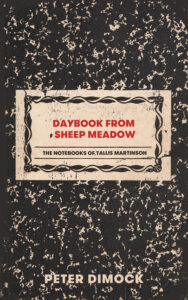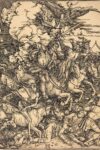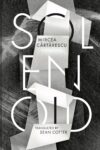
[Deep Vellum Publishing; 2021]
Peter Dimock has now written the same novel three times. In 1998, Dimock, a distinguished editor of many prominent books (mostly political and historical nonfiction), published a novel entitled A Short Rhetoric for Leaving the Family. This work certainly has a unique and idiosyncratic structure: Framed as a letter from the novel’s protagonist, Jarlath Lanham, to two younger members of the family, the “story” on one level relates the narrator’s family history, but more essentially it offers the young recipients a “rhetoric” with which to reflect on and ultimately to reject that history. The Lanham family has occupied an eminent place in the American aristocracy, in particular represented by Jarlath’s father, an advisor to Presidents whom Jarlath has come to revile for his participation in the prosecution of the Vietnam War. Indeed, it is the memorandum (“National Security Action Memorandum 328”) written by his father and approved by the President (LBJ is never mentioned by name) in 1965 that is the family shame Jarlath cannot escape and to which he obsessively returns in developing his rhetoric.
Although the novel is thus divided into the four elements of this rhetoric — Invention, Arrangement, Style, Delivery — each of them contribute to an even more elaborate “method” Jarlath has devised to escape the legacy of his father’s shame, and by extension the American exceptionalism that the Lanham family has helped to perpetuate. Through the use of selected photographs and the disciplining of memory, the young boys are instructed how, when they attain their legal maturity, to cultivate and deliver the “sweet invective” that will renounce the war crimes committed by the father (as well as his brother, who was party to an atrocity during the war, in which the brother fought), and by America itself. Implicit, of course, is the presumption that this is the method Jarlath himself has used to free himself from his family’s complicity (at least willing complicity) with America’s abuse of power, although at the time Jarlath is composing his letter, he tells us, he has just been released from the “Conway Cooperative Care Center,” where he has been treated for what was clearly a mental breakdown. How much of Jarlath’s “method” might be a legitimate tool for self-adjustment and how much a product of continuing psychological instability is perforce left to the reader’s judgment.
As a political novel focused on the Vietnam era as emblematic of the failure of American democracy to live up to its stated ideals, A Short Rhetoric for Leaving the Family is unorthodox enough, and sufficiently rooted in the complexities of family dynamics, to maintain interest despite its ultimately rather conventional political critique. Unfortunately, the formal ingenuity of the novel is somewhat tarnished when considering Dimock’s second novel, George Anderson: Notes for a Love Song in Imperial Time (2012), which turns out to be, given slightly transfigured circumstances and a different cast of characters, essentially another version of the first. This time the framing letter is written by Theo Fales, a book editor who has helped to shepherd into existence numerous books by prominent political figures. It’s addressed to “David Kallen,” author of an Office of Legal Counsel memo authorizing the use of torture in the second Iraq War, a memo ostensibly intended to reaffirm the U.S. government’s opposition to torture. Fales lays out his own “method” for, in this case, overcoming the cognitive dissonance created by the memo by facing it and by reckoning with the hypocrisies and injustices of American history. If anything, Fales’s method is even more byzantine than Jarlath Lanham’s, but it mostly follows Jarlath’s previous effort to defeat the human propensity to lapse back into old ways of thinking by imposing an organized scheme of observance that becomes its own kind of ritual.
It could be said that both A Short History for Leaving the Family and George Anderson are in part about how language can be used to avoid speaking the truth (at times to actively subvert it), as well as the difficulty a single individual encounters in finding efficacious language to counteract the pernicious speech. The intricacy of the “method” each narrator devises itself indicates that ordinary language alone can’t reverse the linguistic corruption brought about by the public officials who convert ordinary language into an instrument for the adulteration of truth. Theo Fales attempts to supplement the urgency of his own voice with visual aids and excerpts from external documents (the entire memorandum prepared for the U.S. Attorney General that motivates Fales’s project is included as an appendix to the letter).
This approach is accelerated in Dimock’s new novel, Daybook from Sheep Meadow. The narrator, Christopher Martinson, has in fact largely give up the task of expounding this latest version of the deprogramming method in his own language. Instead, the novel takes the form of selections from the notebooks compiled by Tallis Martinson, his brother, with annotations and an introduction by Christopher. It is Tallis’s method that the novel presents.
To be sure, Christopher’s annotations offer context and information that the notebooks themselves do not provide. For one thing, Tallis Martinson has committed himself to a mental hospital when the novel begins (unlike Jarlath Lanham, Tallis will not recover), and his notebooks could be interpreted as the record of his descent into mental illness. For another, the notebooks are dominated by quotations from historical figures (John James Audubon, Emmanuel Levinas), passages from Dante and other poets, and transcriptions of various sorts, and much of Tallis’s method of extricating oneself from the mindset of American empire (a goal virtually identical to the goals motivating the protagonists of the first two novels) must be inferred from the uses to which Tallis puts his invocations of other writers and texts. In his “Author’s Note,” Dimock himself calls this strategy “linguistic dispersion,” but the textual fragments are so radically dispersed that the synthesis required to understand both Tallis’s experience and his “method” may be more intelligible to Tallis than to the reader.
Tallis Martinson is a military historian, and the story of his disillusionment and subsequent breakdown seems to have been initiated by his testimony to a Congressional committee about the use of drones in non-battlefield situations, when an attempt to advise restraint instead becomes a disjointed and quasi-paranoid debacle. But Tallis identifies the ultimate source of his transformation in a mystical experience in Central Parks’ Sheep Meadow several years before. Here, as he watches a helicopter hover overhead, he has visions of the Meadow as the target of a drone strike, and the full horror, the “absolute violence” of the American presence in the world, become all too real. Like Jarlath Lanham and Theo Fales, Tallis Martinson (and through him, his brother) finds the boundless gap between his earlier assent to the principles America supposedly embodies and the maleficent actions it has habitually undertaken to be too much to accept. And thus the inception of the notebooks and the historical method that might free us from our complacency.
It really is hard to imagine a novel more devoted to a polemical, political purpose than Daybook from Sheep Meadow (except perhaps for A Short History for Leaving the Family and George Anderson). So clear is the goal of highlighting American perfidy (or more precisely, the perfidy of the American ruling classes), in fact, that it can be tempting to skip over the multitude of quoted passages and the minutiae of the method as increasingly superfluous, more so than even the two previous novels, which are also characterized by repetitions, quotes, and citations. Through his introduction and numerous editorial notes, Christopher Martinson emerges as the dominant voice of the novel (and many of the notes turn out to be narrative exposition filling in many of the gaps left by Tallis’s often elliptical notebook entries), but he doesn’t so much take over from Tallis as the novel’s center of interest as attempt to bring coherence to the otherwise disparate elements comprising the text, an effort that does not really succeed in bringing the novel a unifying (or interesting) stylistic identity.
As a kind of summing-up of Tallis’s aims in compiling his notebook, near the end of his introduction Christopher quotes his brother: “These entries provide a rough record of my thoughts and mental condition as I developed and practiced my historical method for refusing empire after the vision I experienced in Sheep Meadow. . . .” That all of Tallis’s sources are gathered in service of this endeavor of “refusing empire” is eventually apparent enough that the content of the passages he cites almost fades into irrelevance. We don’t really need to try and piece together the intricacies of their interconnections because Tallis and Christopher have done this for us and handily reduced them to a slogan — Refuse empire! Daybook from Sheep Meadow becomes a stern and humorless lesson rather than an aesthetically gratifying reading experience.
Daniel Green is a literary critic whose essays and reviews have appeared in a variety of publications, both online and in print. His book of essays, Beyond the Blurb, has been published by Cow Eye Press and his website can be found at: http://noggs.typepad.com.
This post may contain affiliate links.







